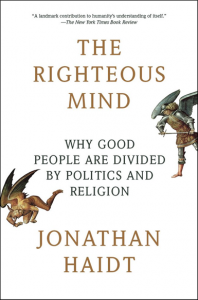 It’s no secret that we live in a world of an increasing political divide. We all watched the recent government shutdown from our respective corners, most people stunned that our country could be brought to its knees by a small cult of radicals, but those same radicals stunned that the rest of the country couldn’t see that we were on the greased slide to Armageddon.
It’s no secret that we live in a world of an increasing political divide. We all watched the recent government shutdown from our respective corners, most people stunned that our country could be brought to its knees by a small cult of radicals, but those same radicals stunned that the rest of the country couldn’t see that we were on the greased slide to Armageddon.
What is the difference, and what does it mean for our country? Social psychologist Jonathan Haidt, (among many others) is contributing to a fascinating body of research on the subject. “For the first time in our history,” he says,  “the parties are not agglomerations of financial or material interest groups, they’re agglomerations of personality styles and lifestyles. And this is really dangerous. Because if it’s just that you have different interests, that doesn’t mean I’m going to hate you. It just means that we’ve got to negotiate, I want to win, but we can negotiate. If it’s now that ‘You people on the other side, you’re really different from me, you live in a different way, you pray in a different way, you eat different foods than I do,’ it’s much easier to hate those people. And that’s where we are.”
“the parties are not agglomerations of financial or material interest groups, they’re agglomerations of personality styles and lifestyles. And this is really dangerous. Because if it’s just that you have different interests, that doesn’t mean I’m going to hate you. It just means that we’ve got to negotiate, I want to win, but we can negotiate. If it’s now that ‘You people on the other side, you’re really different from me, you live in a different way, you pray in a different way, you eat different foods than I do,’ it’s much easier to hate those people. And that’s where we are.”
 “The Righteous Mind” by Jonathan Haidt
“The Righteous Mind” by Jonathan Haidt
In his book “The Righteous Mind”, Haidt explores this divide from the point of moral foundations theory and suggests some ways it might be bridged. We normally send you to the Powells.com website for our Book Spotlights (and clicking here will do exactly that) but this time we have two alternatives you might try as well.
Mother Jones Interview
This first link is to an interview Haidt did with Mother Jones Magazine. It gives you a great outline of the basics of his work with supporting charts and graphs. Most importantly, it includes an audio version of the interview that really gets into the nitty gritty. If you’re not going to read the book (shame on you!) then this is a good way to get an overview.
Take part in actual research on moral foundations
This second link may be even more interesting. A group of professors and students (including Haidt) from three universities built a website to help people examine their own moral underpinnings as well as to gather information for research on moral foundations. There are about 20 different questionnaires you could answer on topics including Consumer Values, “Not-Quite-Everyday Behaviors” (pot use, casual sex, etc.), Justice, Behavioral Inhibition, Ideal Politicians, Moral Scenarios, and much more. You always wondered who they survey for these kind of things… now it can be you.










